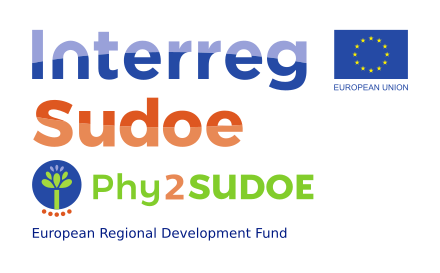Phy2SUDOE (SOE4/P5/E1021): “Advancing in the application of innovative phyto-management strategies in contaminated areas of the SUDOE space”
Start date: 01/11/2020
End date: 30/04/2023
Project length: 30 months
ERDF grant: 838.424,25 €
Project summary
Phyto-management is a phytotechnology, arising from phytoremediation, based on the use of plants (trees, shrubs, herbaceous) to control the risk associated with the presence of contaminants in degraded sites, while: (i) they are generated products (eg, wood, resin, essential oils, bioenergy, ecocatalysts) from harvested biomass; and (ii) the supply of ecosystem services is enhanced (e.g., C sequestration, erosion control, creation of habitats).
Phy2SUDOE aims to value sites contaminated with metals-metalloids and / or organic compounds in the SUDOE region through the use of phyto-management strategies aimed at the generation of ecosystem products and services in these sites, while minimizing the environmental impact of pollutants. could cause. Likewise, this project aims to implement strategies for the conservation of endemic biodiversity typical of some contaminated sites (e.g., metallurgical flora, plant growth-promoting bacteria, etc.) due to their intrinsic and utilitarian value (e.g., biotechnological applications).
Phy2SUDOE is a continuation of the PhytoSUDOE project in which a network of sites was formed, mainly contaminated with metal-metalloids, phyto-managed in the SUDOE region. Phy2SUDOE intends to: (i) consolidate the network formed in the previous project; (ii) expand the aforementioned network of sites with new contamination cases (soils contaminated with organic compounds or with mixed contamination) and innovative phyto-management strategies based on the mixture of plant species; and (iii) promote the conservation of endemic biodiversity in some sites that host biota of conservation and biotechnological interest, while promoting biodiversity through the implementation of phyto-management strategies.
A novel aspect of Phy2SUDOE is the presence of partners of very diverse types: in addition to universities and R&D centers, companies, administrations and site managers participate, which favors the link between the creation of solutions and management strategies.
There are many contaminated sites in the SUDOE area. Phytomanagement is a remediation strategy that combines the reduction of the risk associated with pollutants with the creation of value through the generation of products and ecosystem services. The PhytoSUDOE project created a network of sites (PhytoSUDOE Network) in which the benefits of various phytomanagement options on soil quality were demonstrated, mainly on sites contaminated with trace elements. Phy2SUDOE aims to transfer this knowledge, acquired by mainly academic centres, to managers of contaminated sites included as partners and associated partners (administrations, companies). To this end, new sites have been incorporated with different pollution casuistry (type/use of the land, organic pollutants/mixtures) where new phytomanagement strategies will be applied using the harmonised methodology developed in PhytoSUDOE.

